All reviews -
Movies (109)
Battleship Potemkin review
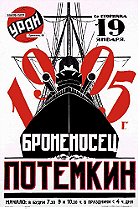 Posted : 11 years, 11 months ago on 4 July 2013 02:41
(A review of Battleship Potemkin)
Posted : 11 years, 11 months ago on 4 July 2013 02:41
(A review of Battleship Potemkin)After the success of Strike (1924), Sergei Eisenstein was commissioned by the Soviet government to make a film commemorating the uprising of 1905. Eisenstein's scenario, boiled down from what was to have been a multipart epic of the occasion, focussed on the crew of the battleship Potemkin. Fed up with the extreme cruelties of their officers and their maggot-ridden meat rations, the sailors stage a violent mutiny. This, in turn, sparks an abortive citizens' revolt against the Czarist regime. The film's centerpiece is staged on the Odessa Steps, where in 1905 the Czar's Cossacks methodically shot down rioters and innocent bystanders alike. To Eisenstein, this single bloody incident was the crucible of the successful 1917 Bolshevik revolution, and the result was the "Odessa Steps sequence," which is often considered the most famous sequence ever filmed; it is certainly one of the most imitated, perhaps most overtly by Brian De Palma in The Untouchables (1987). This triumph of Eisenstein's "rhythmic editing" technique occurs in the middle of film, not as the climax, as more current film structure might do it. All the actors in the film were amateurs, selected by Eisenstein because of their "rightness" as types for their roles. Pictorial quality varies from print to print, but even in a duped-down version, Battleship Potemkin is must-see cinema. ~ Hal Erickson, Rovi
Unrated, 1 hr. 5 min.
Drama, Art House & International, Classics
Directed By: Sergei M. Eisenstein
Written By: Nina Agadzhanova
In Theaters: Dec 24, 1925 Wide
On DVD: Oct 7, 1998
US Box Office:$51.0k
Kino International
 0 comments, Reply to this entry
0 comments, Reply to this entry
City Lights review
 Posted : 11 years, 11 months ago on 4 July 2013 02:39
(A review of City Lights)
Posted : 11 years, 11 months ago on 4 July 2013 02:39
(A review of City Lights)Charles Chaplin was deep into production of his silent City Lights when Hollywood was overwhelmed by the talkie revolution. After months of anguished contemplation, Chaplin decided to finish the film as it began--in silence, save for a musical score and an occasional sound effect. Once again cast as the Little Tramp, Chaplin makes the acquaintance of a blind flower girl (Virginia Cherrill), who through a series of coincidences has gotten the impression that the shabby tramp is a millionaire. A second storyline begins when the tramp rescues a genuine millionaire (Harry Myers) from committing suicide. When drunk, the millionaire expansively treats the tramp as a friend and equal; when sober, he doesn't even recognize him. The two plots come together when the tramp attempts to raise enough money for the blind girl to have an eye operation. Highlights include an extended boxing sequence pitting scrawny Chaplin against muscle-bound Hank Mann, and the poignant final scene in which the now-sighted flower girl sees her impoverished benefactor for the first time. Chaplin's decision to release the silent City Lights three years into the talkie era was partially vindicated when more than one critic singled out this "comedy in pantomime" as the best picture of 1931. ~ Hal Erickson, Rovi
G, 1 hr. 21 min.
Drama, Romance, Classics, Comedy
Directed By: Charles Chaplin
Written By: Charles Chaplin
In Theaters: Jan 1, 1931 Wide
On DVD: Feb 8, 2000
Twentieth Century Fox Home Entertainment
 0 comments, Reply to this entry
0 comments, Reply to this entry
The Old Garden review
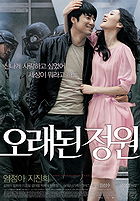 Posted : 11 years, 11 months ago on 3 July 2013 03:00
(A review of The Old Garden)
Posted : 11 years, 11 months ago on 3 July 2013 03:00
(A review of The Old Garden)the Old Garden (오래된 정원) is a 2007 South Korean film, based on the novel by the same name, by the author Hwang Sok-yong. It is directed by Im Sang-soo and stars Yeom Jeong-ah, Ji Jin-Hee and Yoon Yeo-jeong.[2][3][4] It is adapted from a best-selling novel by Hwang Suk-young.[5] It premiered at the 2006 San Sebastian Film Festival.[6]
The plot of the film involves a couple during the turbulent political landscape in early 1980s South Korea, and the events surrounding the Gwangju Massacre.
Contents
1 Plot
2 Awards and nominations
3 References
Plot
Hyun-Woo is released from prison after spending 17 years behind bars. During his college days he was involved in the student led anti-government protests that swept across Korea in the early 1980s. Now that he is finally free, Hyun-Woo travels back to the town where he spent a few precious months immediately prior to his arrest.
Seventeen years ago, Hyun-Woo fled into the rural area of Korea, hiding from the government that was trying to quash his anti-government group. He found sanctuary in the home of Han Yun-Hee. She was a former sympathizer to the anti-government cause, but now living a modest life as a teacher in a small rural community. The couple quickly became intimate, Hyun-Woo able to provide the spark that was missing from Yun-Hee’s simple life.
Unfortunately, while Hyun-Woo was still hiding in Yun-hee’s home, he learned that most of his fellow anti-government protesters were captured & imprisoned. Even though the government now has Hyun-Woo high on their wanted list, he feels ashamed that he is living peacefully, while his friends are imprisoned. Thus, he makes the difficult decision to leave Yun-hee and go back to the movement centered in Seoul. What he would later learn is that he left behind the sole person that would stay faithful to him throughout his 17 year imprisonment and also the woman that was carrying his baby.
Awards and nominations
2008 Asian Film Awards[7]
Nomination – Best Screenplay - Im Sang-soo
Nomination – Best Editing
2007 Baeksang Arts Awards
Best Actress - Yeom Jeong-ah
The plot of the film involves a couple during the turbulent political landscape in early 1980s South Korea, and the events surrounding the Gwangju Massacre.
Contents
1 Plot
2 Awards and nominations
3 References
Plot
Hyun-Woo is released from prison after spending 17 years behind bars. During his college days he was involved in the student led anti-government protests that swept across Korea in the early 1980s. Now that he is finally free, Hyun-Woo travels back to the town where he spent a few precious months immediately prior to his arrest.
Seventeen years ago, Hyun-Woo fled into the rural area of Korea, hiding from the government that was trying to quash his anti-government group. He found sanctuary in the home of Han Yun-Hee. She was a former sympathizer to the anti-government cause, but now living a modest life as a teacher in a small rural community. The couple quickly became intimate, Hyun-Woo able to provide the spark that was missing from Yun-Hee’s simple life.
Unfortunately, while Hyun-Woo was still hiding in Yun-hee’s home, he learned that most of his fellow anti-government protesters were captured & imprisoned. Even though the government now has Hyun-Woo high on their wanted list, he feels ashamed that he is living peacefully, while his friends are imprisoned. Thus, he makes the difficult decision to leave Yun-hee and go back to the movement centered in Seoul. What he would later learn is that he left behind the sole person that would stay faithful to him throughout his 17 year imprisonment and also the woman that was carrying his baby.
Awards and nominations
2008 Asian Film Awards[7]
Nomination – Best Screenplay - Im Sang-soo
Nomination – Best Editing
2007 Baeksang Arts Awards
Best Actress - Yeom Jeong-ah
 0 comments, Reply to this entry
0 comments, Reply to this entry
H review
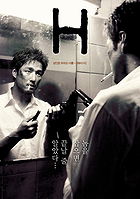 Posted : 11 years, 11 months ago on 3 July 2013 02:55
(A review of H)
Posted : 11 years, 11 months ago on 3 July 2013 02:55
(A review of H)H is a 2002 South Korean thriller film. It was written and directed by Lee Jong-hyuk, and stars Ji Jin-hee, Jo Seung-woo and Yeom Jeong-ah. The story follows a serial killer who preyed on pregnant women has been behind bars for 10 months when a copycat killer becomes active. Detectives meet with the imprisoned killer and search for clues in an effort to head off the copy cat killer before he finishes. The movie was made in Telugu as Amaravathi directed by Ravi Babu with Taraka Ratna as the antogonist.
Contents
1 Plot
2 Cast
3 Awards
4 Reception
5 References
6 External links
Plot
Twenty-two year-old serial killer Shin Hyun targeted pregnant women and turned himself in after committing several grisly murders. Ten months later a copycat killer became active, and detectives Kang and Kim are put on the case.
They track down the killer by following clues from the first two victims: A pregnant schoolgirl whose fetus the killer removed, and a single mother strangled from behind on a bus. They had tried to pump Shin for information, but without success. They stake out the killer's home, but when the killer comes home, he notices the cops and runs. Kang follows him into a nightclub, where the killer slices off a lesbian's ear and then slits her throat, just like Shin's third victim. Kang fires two rounds into his chest; this puts him in a coma. Despite this, the murders still continue. The police capture the next suspect, but the murders keep occurring.
In the end, it is revealed that Shin's mother had tried to abort him, but he survived. The psychologist Dr. Chu had used post-hypnotic suggestion on the other two killers to make them commit copycat murders. Kang then kills Chu (imitating Shin's murder of an abortion doctor), but Kang is triggered by a CD mailed to him. Kang kills his own mother, who was a prostitute.
In the course of the movie, Shin is executed and his final words are "I killed my mother." This explains the sixth and last unidentified victim, whom he brought in a bag to the police station when he confessed. Kang is about to commit suicide when Kim shows up and kills him instead.
Just before the ending credits, the letter "H" appears and expands into the word "hypnosis", and its definition.
Cast
Ji Jin-hee as Detective Kang Tae Hyun
Jo Seung-woo as Shin Hyun
Yeom Jeong-ah as Detective Kim Mi Yun
Kim Sun-kyung as Dr. Chu Kyung-sook
Awards
H was nominated for the 2004 International Fantasy Film Award for best film.
Contents
1 Plot
2 Cast
3 Awards
4 Reception
5 References
6 External links
Plot
Twenty-two year-old serial killer Shin Hyun targeted pregnant women and turned himself in after committing several grisly murders. Ten months later a copycat killer became active, and detectives Kang and Kim are put on the case.
They track down the killer by following clues from the first two victims: A pregnant schoolgirl whose fetus the killer removed, and a single mother strangled from behind on a bus. They had tried to pump Shin for information, but without success. They stake out the killer's home, but when the killer comes home, he notices the cops and runs. Kang follows him into a nightclub, where the killer slices off a lesbian's ear and then slits her throat, just like Shin's third victim. Kang fires two rounds into his chest; this puts him in a coma. Despite this, the murders still continue. The police capture the next suspect, but the murders keep occurring.
In the end, it is revealed that Shin's mother had tried to abort him, but he survived. The psychologist Dr. Chu had used post-hypnotic suggestion on the other two killers to make them commit copycat murders. Kang then kills Chu (imitating Shin's murder of an abortion doctor), but Kang is triggered by a CD mailed to him. Kang kills his own mother, who was a prostitute.
In the course of the movie, Shin is executed and his final words are "I killed my mother." This explains the sixth and last unidentified victim, whom he brought in a bag to the police station when he confessed. Kang is about to commit suicide when Kim shows up and kills him instead.
Just before the ending credits, the letter "H" appears and expands into the word "hypnosis", and its definition.
Cast
Ji Jin-hee as Detective Kang Tae Hyun
Jo Seung-woo as Shin Hyun
Yeom Jeong-ah as Detective Kim Mi Yun
Kim Sun-kyung as Dr. Chu Kyung-sook
Awards
H was nominated for the 2004 International Fantasy Film Award for best film.
 0 comments, Reply to this entry
0 comments, Reply to this entry
Ben-Hur review
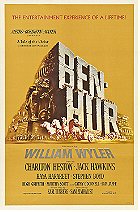 Posted : 11 years, 11 months ago on 19 June 2013 02:59
(A review of Ben-Hur)
Posted : 11 years, 11 months ago on 19 June 2013 02:59
(A review of Ben-Hur)Record-breaking winner of 11 Oscars, including Best Picture, Director, Actor, Supporting Actor, and Score, this epic masterpiece stars Charlton Heston ("The Ten Commandments," "Touch of Evil") in the title role of a rebellious Israelite Jew who takes on the Roman Empire during the time of Christ. Featuring one of the most famous action sequences of all time -- the breathtaking chariot race. Directed by Oscar-winner William Wyler ("Mrs. Miniver," "The Best Years of Our Lives"). Recently selected as one of the top 100 American films of all time by the prestigious American Film Institute.
 0 comments, Reply to this entry
0 comments, Reply to this entry
How Green Was My Valley (1941) review
 Posted : 11 years, 11 months ago on 19 June 2013 02:54
(A review of How Green Was My Valley (1941))
Posted : 11 years, 11 months ago on 19 June 2013 02:54
(A review of How Green Was My Valley (1941))Spanning 50 years, director John Ford's How Green Was My Valley revolves around the life of the Morgans, a Welsh mining family, as told through the eyes of its youngest child Huw (Roddy McDowall). Over the years, the family struggles to survive through unionization, strikes, and child abuse. As they do so, their hometown and its culture begins to slowly decline. Donald Crisp portrays Gwilym, the patriarch of the Morgan household, who dreams of a better life for young Huw. Based on the novel of the same name by Richard Llewellyn, How Green Was My Valley won five Academy Awards in 1941, including Best Director, Best Supporting Actor (Crisp), Best Art Director, Best Cinematography, and Best Picture (beating Citizen Kane). The book was later adapted into a 1975 BBC miniseries. ~ Matthew Tobey, Rovi
 0 comments, Reply to this entry
0 comments, Reply to this entry
Dragon: The Bruce Lee Story
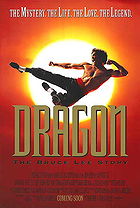 Posted : 13 years, 5 months ago on 19 December 2011 04:03
(A review of Dragon: The Bruce Lee Story (1993))
Posted : 13 years, 5 months ago on 19 December 2011 04:03
(A review of Dragon: The Bruce Lee Story (1993))The film begins with a nightmare of Bruce Lee's father (Ric Young), who sees a demon (Sven-Ole Thorsen) in medieval armor that hunts the young Bruce Lee (Duncan Chow). Bruce is shown as a child receiving instruction in traditional Chinese martial arts in a montage that passes quickly through his teenage years in Hong Kong. As a young adult, Bruce (Jason Scott Lee) becomes involved in a fight with British sailors (who are harassing a young Chinese woman) and this results in him having to leave Hong Kong because of the incident. His father suggests that Bruce go to the US, since he was actually born in San Francisco when his father was on a tour there and has a US birth certificate. His father asks Bruce to become a success, so big a success that his name will be famous even back in Hong Kong.
In the US, Bruce starts off working as a dishwasher at a Chinese restaurant, where he becomes involved in a fight with some of the staff, and he fends them off until the restaurant owner (Nancy Kwan) arrives and fires Bruce. As well as severance she gives him an all-purpose loan and convinces him to use the money to invest in a future with education. At a university, he begins to teach martial arts classes, and during these classes he meets Linda Emery (Lauren Holly), and the two begin dating. They eventually marry in defiance of Linda's racist mother. Linda suggests that Bruce open up a martial arts training school, which he does, but some other Chinese martial arts schools feel that he should not train non-Chinese, and they challenge him to fight Johnny Sun (John Cheung) to resolve the issue. Bruce wins the fight but Sun attacks Bruce from behind after the fight is over, resulting in a serious back injury.
While immobilized and recovering Bruce and Linda quarrel of why he did not tell her about this duel, but she furiously rejects his despairing assumption that she will abandon him because of this injury. To give his recovery time purpose, Linda coaxes him to examine the weaknesses of his combat technique, which leads to him developing the fight philosophy of Jeet Kune Do while she helps him write "The Tao of Jeet Kune Do." During this period Linda gives birth to their first child, Brandon, and he is the key for the couple to reconcile with Linda's mother (Michael Learned). Later at Ed Parker's martial arts tournament, Bruce has a new face-off with Johnny Sun, this time in a 60-second demonstration of his new fighting style. Johnny Sun appears to have the upper hand in the first half of the match but then Bruce recovers and ends up kicking Sun over the top rope.
After the match, Bruce meets Bill Krieger (Robert Wagner) and is hired for The Green Hornet TV show. Bruce and Bill work together and create the idea for Kung Fu. At a cast party, Linda says she is now pregnant with their second child, Shannon. Shortly afterwards, there is an announcement for the cancellation of The Green Hornet. The show Kung Fu makes it onto television, but starring David Carradine and not Bruce.
Bruce travels back home for his father's funeral and whilst in the country is soon approached by Philip Tan (Kay Tong Lim), a Hong Kong film producer. He says that Bruce is well-known in Hong Kong and that The Green Hornet show is called The Kato Show there. Bruce begins work on The Big Boss. In the filming of the final scene, set in an ice factory, the brother of Johnny Sun attacks Bruce, wanting revenge. Bruce successfully defends himself against the attack. The Big Boss is a success and Bruce makes several more films – working as actor, director and editor. This causes a rift between Bruce and Linda, as the latter wishes to return to the States. Bill Krieger shows up, and although he knows that Bruce is still angry with him, he offers him a chance to work on a big-budget Hollywood movie, which Bruce decides to do, particularly as Linda feels she must return. On the 32nd day of shooting Enter the Dragon, Bruce is embroiled in a final battle with his childhood demon. At the end, he decides to walk off of the set and go home to see his family. The film ends during a shot of the final scene of Enter the Dragon, with a voice-over by Linda informing the audience of his death before the movie's release, and her preferred choice to discuss his life, not his death.
In the US, Bruce starts off working as a dishwasher at a Chinese restaurant, where he becomes involved in a fight with some of the staff, and he fends them off until the restaurant owner (Nancy Kwan) arrives and fires Bruce. As well as severance she gives him an all-purpose loan and convinces him to use the money to invest in a future with education. At a university, he begins to teach martial arts classes, and during these classes he meets Linda Emery (Lauren Holly), and the two begin dating. They eventually marry in defiance of Linda's racist mother. Linda suggests that Bruce open up a martial arts training school, which he does, but some other Chinese martial arts schools feel that he should not train non-Chinese, and they challenge him to fight Johnny Sun (John Cheung) to resolve the issue. Bruce wins the fight but Sun attacks Bruce from behind after the fight is over, resulting in a serious back injury.
While immobilized and recovering Bruce and Linda quarrel of why he did not tell her about this duel, but she furiously rejects his despairing assumption that she will abandon him because of this injury. To give his recovery time purpose, Linda coaxes him to examine the weaknesses of his combat technique, which leads to him developing the fight philosophy of Jeet Kune Do while she helps him write "The Tao of Jeet Kune Do." During this period Linda gives birth to their first child, Brandon, and he is the key for the couple to reconcile with Linda's mother (Michael Learned). Later at Ed Parker's martial arts tournament, Bruce has a new face-off with Johnny Sun, this time in a 60-second demonstration of his new fighting style. Johnny Sun appears to have the upper hand in the first half of the match but then Bruce recovers and ends up kicking Sun over the top rope.
After the match, Bruce meets Bill Krieger (Robert Wagner) and is hired for The Green Hornet TV show. Bruce and Bill work together and create the idea for Kung Fu. At a cast party, Linda says she is now pregnant with their second child, Shannon. Shortly afterwards, there is an announcement for the cancellation of The Green Hornet. The show Kung Fu makes it onto television, but starring David Carradine and not Bruce.
Bruce travels back home for his father's funeral and whilst in the country is soon approached by Philip Tan (Kay Tong Lim), a Hong Kong film producer. He says that Bruce is well-known in Hong Kong and that The Green Hornet show is called The Kato Show there. Bruce begins work on The Big Boss. In the filming of the final scene, set in an ice factory, the brother of Johnny Sun attacks Bruce, wanting revenge. Bruce successfully defends himself against the attack. The Big Boss is a success and Bruce makes several more films – working as actor, director and editor. This causes a rift between Bruce and Linda, as the latter wishes to return to the States. Bill Krieger shows up, and although he knows that Bruce is still angry with him, he offers him a chance to work on a big-budget Hollywood movie, which Bruce decides to do, particularly as Linda feels she must return. On the 32nd day of shooting Enter the Dragon, Bruce is embroiled in a final battle with his childhood demon. At the end, he decides to walk off of the set and go home to see his family. The film ends during a shot of the final scene of Enter the Dragon, with a voice-over by Linda informing the audience of his death before the movie's release, and her preferred choice to discuss his life, not his death.
 0 comments, Reply to this entry
0 comments, Reply to this entry
Emperor of the North
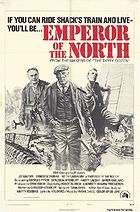 Posted : 13 years, 5 months ago on 19 December 2011 04:02
(A review of Emperor of the North)
Posted : 13 years, 5 months ago on 19 December 2011 04:02
(A review of Emperor of the North)Shack is a sadistic bully of a railroad conductor who takes it upon himself to forcibly remove any hobo who tries to ride on his train. Shack has an assortment of makeshift weapons: a hammer, a steel rod, and a chain.
A hobo who is a hero to his peers, A-No.1, manages to hop the train with the younger, less-experienced Cigaret not far behind. At the next stop, A-No.1 evades Shack and escapes into the hobo jungle, but Cigaret is caught. Shack threatens to kill Cigaret, who is bragging that he and he alone got a free ride.
Shack is distracted when he gets the message that A-No.1 (whom he knows by reputation) has announced that he will become the first hobo to ride Shack's train all the way to Portland.
The other hobos agree that the first who can successfully ride Shack's train will have earned the title "Emperor of the North Pole." Railroad workers place bets whether A-No.-1 can do it, spreading the news far and wide over the telegraph, Shack being widely known and disliked.
A-No.1 hops the train and does everything he can to steer clear of Shack, pulling a series of pranks with the help of other hobos, such as running Shack's train into a siding. He tries to rid himself of the company of Cigaret, who tags along and makes a general pest of himself. Shack succeeds in ejecting the two, but they board a fast passenger train which overtakes Shack's train and ride it to Salem, Oregon.
There they have several farcical encounters, including one with a policeman who chases the two into the Salem hobo jungle, accusing them of stealing a turkey. They also encounter a Holiness minister holding an outdoor baptism service.
The two hobos reboard Shack's train after it arrives in Salem. The story ends with a climactic fight, involving heavy chains, planks of wood and an ax. A-No.1 ultimately has the bloodied Shack at his mercy, but instead of killing him, he just throws him off the train. He then tosses Cigaret off for bragging about how "they" defeated Shack, telling the kid he could have become a good bum but he's got no class.
A hobo who is a hero to his peers, A-No.1, manages to hop the train with the younger, less-experienced Cigaret not far behind. At the next stop, A-No.1 evades Shack and escapes into the hobo jungle, but Cigaret is caught. Shack threatens to kill Cigaret, who is bragging that he and he alone got a free ride.
Shack is distracted when he gets the message that A-No.1 (whom he knows by reputation) has announced that he will become the first hobo to ride Shack's train all the way to Portland.
The other hobos agree that the first who can successfully ride Shack's train will have earned the title "Emperor of the North Pole." Railroad workers place bets whether A-No.-1 can do it, spreading the news far and wide over the telegraph, Shack being widely known and disliked.
A-No.1 hops the train and does everything he can to steer clear of Shack, pulling a series of pranks with the help of other hobos, such as running Shack's train into a siding. He tries to rid himself of the company of Cigaret, who tags along and makes a general pest of himself. Shack succeeds in ejecting the two, but they board a fast passenger train which overtakes Shack's train and ride it to Salem, Oregon.
There they have several farcical encounters, including one with a policeman who chases the two into the Salem hobo jungle, accusing them of stealing a turkey. They also encounter a Holiness minister holding an outdoor baptism service.
The two hobos reboard Shack's train after it arrives in Salem. The story ends with a climactic fight, involving heavy chains, planks of wood and an ax. A-No.1 ultimately has the bloodied Shack at his mercy, but instead of killing him, he just throws him off the train. He then tosses Cigaret off for bragging about how "they" defeated Shack, telling the kid he could have become a good bum but he's got no class.
 0 comments, Reply to this entry
0 comments, Reply to this entry
Cat Ballou
 Posted : 13 years, 5 months ago on 19 December 2011 04:00
(A review of Cat Ballou)
Posted : 13 years, 5 months ago on 19 December 2011 04:00
(A review of Cat Ballou)Catherine Ballou (Jane Fonda), an aspiring schoolteacher, is traveling by train to Wolf City, Wyoming, to visit her rancher father, Frankie Ballou (John Marley). En route she unwittingly helps accused cattle rustler Clay Boone (Michael Callan) elude his captor, the sheriff (Bruce Cabot), when Boone's Uncle Jed (Dwayne Hickman), a drunkard disguised as a preacher, distracts the lawman. She reaches the ranch to find that the Wolf City Development Corporation is trying to take the ranch away from her father, whose only defender is an educated Indian, Jackson Two-Bears (Tom Nardini). Clay and Jed appear and reluctantly offer to help Catherine. She also hires legendary gunfighter Kid Shelleen (Lee Marvin) to come and help protect her father from fast-drawing Tim Strawn (also Marvin), alias Silvernose, the hired killer who is threatening Frankie.
Shelleen arrives, a drunken stumblebum who is literally unable to hit the broad side of a barn when he shoots and whose pants fall down when he draws his gun. Strawn kills Frankie, and when the townspeople refuse to bring him to justice, Catherine becomes a revenge-seeking outlaw known as Cat Ballou. She and her four gang members rob a train carrying the Wolf City payroll, and Shelleen, inspired by his love for Cat (unrequited because she loves Clay), shapes up and kills Strawn. Later he casually reveals that Strawn was his brother.
Cat poses as a lady of loose morals and confronts town boss Sir Harry Percival (Reginald Denny), owner of the Wolf City Development Corporation. A struggle ensues, Sir Harry is killed, and Cat is sentenced to be hanged on the gallows. Just after the noose is placed around her neck, Uncle Jed (again as a fake preacher) cuts the rope as she falls through the trapdoor. Her gang then spirits her away in a daring rescue
Shelleen arrives, a drunken stumblebum who is literally unable to hit the broad side of a barn when he shoots and whose pants fall down when he draws his gun. Strawn kills Frankie, and when the townspeople refuse to bring him to justice, Catherine becomes a revenge-seeking outlaw known as Cat Ballou. She and her four gang members rob a train carrying the Wolf City payroll, and Shelleen, inspired by his love for Cat (unrequited because she loves Clay), shapes up and kills Strawn. Later he casually reveals that Strawn was his brother.
Cat poses as a lady of loose morals and confronts town boss Sir Harry Percival (Reginald Denny), owner of the Wolf City Development Corporation. A struggle ensues, Sir Harry is killed, and Cat is sentenced to be hanged on the gallows. Just after the noose is placed around her neck, Uncle Jed (again as a fake preacher) cuts the rope as she falls through the trapdoor. Her gang then spirits her away in a daring rescue
 0 comments, Reply to this entry
0 comments, Reply to this entry
Bite the Bullet
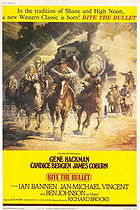 Posted : 13 years, 5 months ago on 19 December 2011 03:56
(A review of Bite the Bullet)
Posted : 13 years, 5 months ago on 19 December 2011 03:56
(A review of Bite the Bullet)Based on actual events of the early twentieth century, the story concerns a grueling 700-mile cross-country horse race in 1906 and the way it affects the lives of its various participants.
The colorful contestants include two former Rough Riders (Hackman and Coburn) who can't let friendship come between them if they intend to win, a lady of little virtue (Bergen) with an ulterior motive, a punk kid (Vincent), an old cowhand in poor health (Johnson), an English gentleman (Bannen) who's competing just for the sheer sport of it all, and a Mexican with a toothache (Mario Artaega) who literally needs to bite the bullet. All must race against a thoroughbred of championship pedigree owned by a wealthy man (Coleman) who has no intention of seeing his entry lose.
The film touches on the themes of sportsmanship, animal cruelty, the yellow press, racism, the end of the West and the bonds of marriage and friendship. As the race progresses, the conditions test not only the endurance of horses and riders but also their philosophies of life and the meaning of victory and defeat
The colorful contestants include two former Rough Riders (Hackman and Coburn) who can't let friendship come between them if they intend to win, a lady of little virtue (Bergen) with an ulterior motive, a punk kid (Vincent), an old cowhand in poor health (Johnson), an English gentleman (Bannen) who's competing just for the sheer sport of it all, and a Mexican with a toothache (Mario Artaega) who literally needs to bite the bullet. All must race against a thoroughbred of championship pedigree owned by a wealthy man (Coleman) who has no intention of seeing his entry lose.
The film touches on the themes of sportsmanship, animal cruelty, the yellow press, racism, the end of the West and the bonds of marriage and friendship. As the race progresses, the conditions test not only the endurance of horses and riders but also their philosophies of life and the meaning of victory and defeat
 0 comments, Reply to this entry
0 comments, Reply to this entry
 Login
Login
 Home
Home 93 Lists
93 Lists 109 Reviews
109 Reviews Collections
Collections